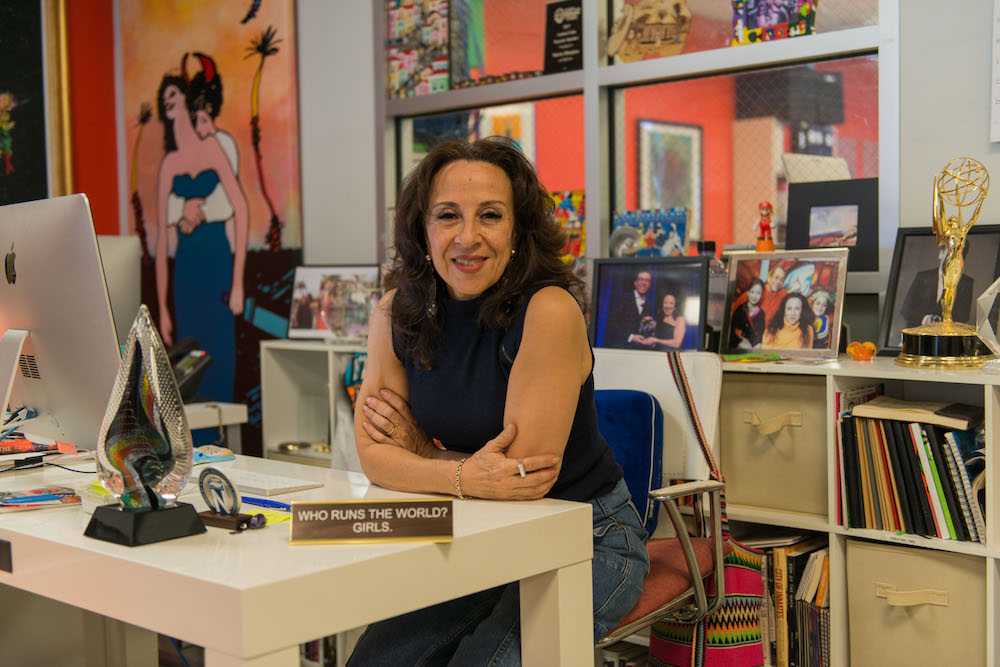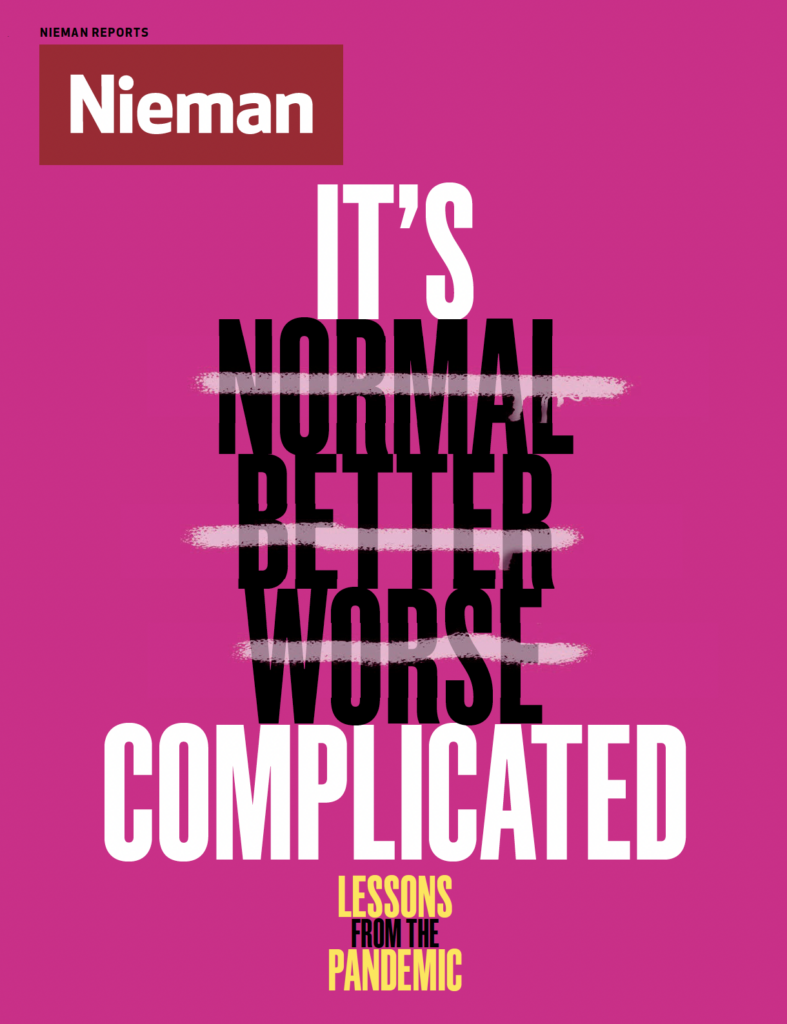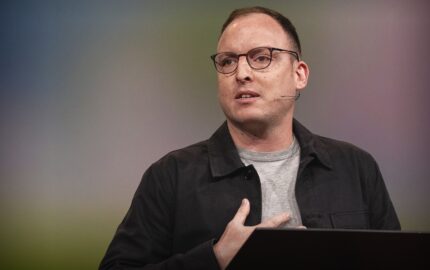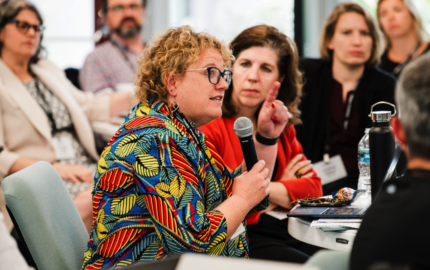Journalist, entrepreneur, and 2020 I.F. Stone Award winner Maria Hinojosa has focused on issues facing historically marginalized communities throughout her three decades in the field. In 1992, she launched Latino USA, one of the earliest public radio programs to focus on Latinx stories, which she still hosts in addition to taking on duties as executive producer in 2000. In 2010, she founded the independent non-profit Futuro Media Group which “explores and gives critical voice to the diversity of the American experience.” Apart from producing Latino USA, the multi-platform operation hosts a number of successful projects including: Latino Rebels, Suave, America by the Numbers, In the Thick, and more.
Hinojosa’s recently published book “Once I Was You: A Memoir of Love and Hate in a Torn America,” uses major turning points in recent American and Latin American history as a vehicle to reflect on her life as a journalist, immigrant, daughter, partner, mother, Mexicana, and more. Latino Book Review described it as “rich in historical context and insights that will strike a chord with readers across borders and cultures.” The monograph also explores the impact of her work on her own mental health.
Hinojosa, who is based in Harlem, spoke with the Nieman Foundation in March about Futuro Media Group, her memoir, immigration coverage, the integration of BIPOC narratives into mainstream news, and more. Edited excerpts:
On the origins of Futuro Media, and recognizing the need for a different news lens
One of the most important moments for me was when I got the U.S. Census data from 2000 that showed that the Latino population in the U.S. — not including migrants — had experienced 43% growth.
I don’t know if that was immediate, but as they released the numbers and everything became crystal clear, I was like, “Wow, wait, there’s such a huge audience.” That stuck with me in terms of what the future really looks like, seriously, in terms of audience. What are we not getting?
At that time, I was at CNN. I was still at NPR. The question, ‘What audience are we leaving on the floor there?’ was very much in the back of my mind. It was out of frustration that Futuro was built. I have to be straight up.
It was when I was told by my dear “60 Minutes,” and they were like, “We love you. Come back when one of these old white guys gets sick or dies.” I got on the subway of 59th Street and cried all the way to Harlem. I didn’t have work. I didn’t want to go back to working for other people.
I was like, “I can’t do that. I’ve already pitched everything to everybody and I don’t want to be doing that anymore.” Straight up, the thought of calling my father, a Mexican immigrant like myself, a medical doctor and researcher at the University of Chicago, and saying, “Papi, I’m on unemployment.” I could not.
Something came into like, “Okay, well, you’ve had people say, ‘Create something.’ You’ve learned how to raise money.” Best thing that I learned after leaving CNN. Best thing. And I just went for it.
It was terrifying. I had everybody criticizing me. They were like, “‘Latino USA’, it’s a radio show. Who cares? Audio is dead. Why are you focusing from a POC point of view? Who cares? Nobody’s going to fund that. Why are you making it a nonprofit instead of forprofit? Make money, Maria. Use your name. Make money.”
At every turn, I was basically like, “You’re really silly.” To get to an answer quickly: The best example of what I love about the tenacity of my fellow journalists, is that it is very risky, what we do. It’s very scary.
Georgia O’Keeffe, there was a quote of hers that said, “I’m terrified every single day of my life, and that’s never stopped me from doing what I have to do.” As journalists, we have to hold onto that. This is what I try to teach, is that you have a gut. We are trained journalists. We have that and we need to listen to it.
My best example of the fruition of all of this work which is riddled with selfdoubt, as I deal with in “Once I Was You,” all the imposter syndrome, is what we dropped this last month, which is “Suave,” the podcast. I meet Suave in 1993 and I start recording him.
Now we have a podcast that is almost 30 years in the making about a journalist and his source, who happened to have been sentenced to life in prison without parole.
Let me end by saying, even within Futuro, the company that I created, my own team was like, “Yeah, we don’t know if there’s a story with ‘Suave.’ You’ve been talking to him for all this time.” It wasn’t until we got the funding money. It wasn’t until we had the funding from Art for Justice that I was able to say to this producer, “sit and listen.”
She said, “Yeah, we have a story here, and guess what? You’re part of it. You’re not even doing the story.”
By the way, it’s going super well at Futuro.
On the complexity of Latinx stories, and the media’s failure to capture it
Here’s the problem that we have right now, is that from being invisible, Latinos and Latinas essentially invisible, even though it was the 1980s when Time magazine declared it “the decade of the Hispanic.” Then, in [2001], a Time magazine cover was [Amexica], like [a combination of] America and Mexico.
We had this visibility, [with celebrities like] JLo, Ricky Martin, but we were still essentially invisible. Now what we have is a hypervisibility that is false.
Writ large, the Latino community, Latinos and Latinas in the United States, we suffer from a complete lack of complexity of understanding who we are in this country, which is why everybody [during the 2020 election] was like, “Oh, my God, Cubans in Miami voted for Trump?” It’s like, “Yeah. Along the border, too.”
We had been reporting that story a long time. We were not surprised. I think writ large, it is simply a lack of understanding of depth, difference, complexity. Now, Latinos and Latinas have to disprove that we are all at the border. That we all cross the border by jumping the wall. That we are all gang members.
That we are all “anchor babies.” That we are all migrant workers or poultry workers. That we are coming here to take “your jobs.” All of those things, that has happened with the help of our colleagues. With the help of our colleagues. We, journalists like me and journalists of conscience, and allies, have to now deconstruct that.
On immigration coverage in mainstream media
Here’s the bigger picture. Here’s what we need to understand. All of you, my dear colleagues, were raised consuming the mainstream media. As was I. The mainstream media has been, for the last 60 years, let’s say, been really unable to cover immigration.
I would actually say that during the 1960s, it was probably covered a little bit more, if you will, black and white, less judgmental. The first televised refugee crisis we have in our country is the Vietnamese people. How do our colleagues manage that? Our colleagues of The New York Times and of CBS News labeled them “boat people” and used that term.
All of us have been raised under a journalism that we need to understand is coming from that prison. In order to break the way that we’re talking about this particular crisis, you have to really deconstruct. We see how long it’s taking in terms of the Black Lives Matter movement and pushing for this kind of conversation in newsrooms.
Now we have to take it and just be like, “OK, now you got to deconstruct everything you think and know about immigrants.” Can you? Can we, as journalists, accept and apologize for using the term “boat people?”
That would be like our colleagues right now, from CNN, or from The New York Times, to go down and look at the people, the refugees, sleeping on the sidewalks in Matamoros [in Tamaulipas, Mexico], and say they are “concrete people.”
That’s why it’s so much larger. That’s why we have to have these conversations amongst journalists, so that we can lovingly say to them, “Bro, sis, you got to deconstruct this to understand.” That takes a lot of work and effort.
On starting a new media company
Here’s what you need to do. Let’s put your feet on the ground, as I. F. Stone would always do for me all the time. Feet on the ground. Out of every philanthropic dollar, less than three pennies is going to independent journalism. Out of every philanthropic dollar, one penny is going to a Latino- or Latina-run institution.
It’s a conversation that, again, we need to impose on philanthropy because in media and journalism, the narratives are being perpetuated. They need to understand that you can’t just give ABC News a million dollars and say, “Do better,” which they’ve done. That’s not how this works. It’s actually very critical thinking.
Having said that, I was terrified. I was afraid. I didn’t know. I don’t want to tell you the number of nights. I’m looking at my bed, because this is my studio in my bedroom. I have different studios for different parts of the house.
I’m like, the number of nights that I was just like, “Jesus Christ, are we going to be able to make it? Oh, my God, am I going to be able to make payroll?” I don’t have those worries now, thank God.
On the narrative of Latinx people in the U.S. becoming more positive
Absolutely it’s going to change. I’m so sure of it. What happened in 2020, in terms of the participation of Latino and Latina voters was like, even though it was not front and center of the news, we’re watching it. I’m watching what that means.
Let me tell you, it could have gone south. Latino/Latina voters could have said, “Forget about it.” They didn’t. The more complex part about it was how many voted for Trump. That is real, too. The Latino/Latina Trump reality is real. I have family members who are Trumpy in Mexico. In Mexico, my family, who I love. Let’s be real.
On the other hand, who’s one of the most exciting politicians that you actually want to see what she’s doing? [Rep.] Alexandria Ocasio Cortez. Really interesting. If you do Instagram, you’re like, “Whoa, Alexandria.” Talk about what she shares, brand, and sharing. I’m like, “Whoa.”
She’s going to run for president. We know it. It’s just a matter of when and how. That energy that is going to bring a generation of young Latinos… What we fail to understand and what our colleagues fail to understand is that Latinos and Latinas are going to drive population growth along with Asian-Americans.
If you are not understanding that, journalistically, again, you’re going to miss out. Plus, you’re doing bad journalism. It’s not lost one me. CNN did just name its new anchors. Three Latino. Up and coming journalists are creating space. I’m just saying. That’s not “rah rah Latinos.” That is what the future looks like.
I think that is why Latino USA continues … our numbers continue to grow because we’re doing this deep reporting.
On integrating BIPOC stories into mainstream media coverage
Sometimes it’s so hard to make this, because it’s just like, you never know. To be honest with you, I’m watching [media outlets] very closely. We now have a Latino running a major network. Cesar Conde is running NBC, MSNBC, CNBC. He’s been there a year. Things don’t happen immediately. I’m taking a close eye to what this looks like.
I don’t have the answer. I’m thinking, for example, in some ways, the “Suave” podcast is a piece that is very Latinocentric. Also, it’s just gone out in the world. It’s the best way in which both things are happening.
In some ways, the “Suave” story is hyperlocal, related to Philadelphia, Pennsylvania prisons, juvenile lifers. On the other hand, it’s just like a really deep human story. I’m just like, keep on at it. you’re trying to figure this out. Many times, we’re just building the plane as we’re flying it. That’s OK, too.
That’s what I’m talking about. That’s why it’s really problematic. That’s why you have to have these larger conversations, which is if you’re not then you are not practicing excellence in journalism.
My colleague, Julio Ricardo Varela, is a contributor at NBC Latino. I think it’s a platform that is really important. NBC Black, NBC Asian, I actually think those are really important platforms. They should exist. The point is that if the home page is not understanding the complexity… they’re not practicing their best journalism.
That’s the thing that makes you stop, when you see something that’s from a different perspective. You’re like, “I want to see that.”
This is why it’s, in some ways, easier to be independent, because the riskier moves that you take, the buck falls on you. Whereas when you’re in corporate media, the buck falls on a lot of people, and so people may not take the risks that they need to take.
That may mean simply from this very structural racist perspective, which is, “Well, do I put these on the front page or not? Is it going to do well?” I’m like, what is your responsibility as a journalist?
Editor’s Note: Due to reporting errors, the article has been updated to reflect Hinojosa’s correct employment history.




